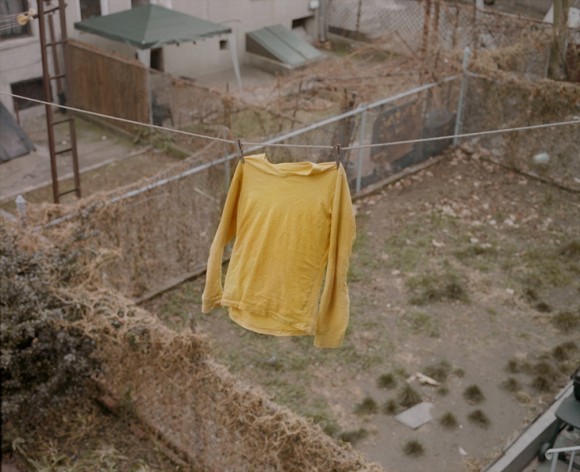The only real superhero I know lies sandwiched between blue and green tarps beneath the northbound lanes of the Fulton Avenue Overpass, ever since last winter’s screaming winds drove him, sonofabitching, into the pigeon-shitted ass-crack of the concrete bridge abutment. Just because a man has some powers doesn’t mean he won’t feel the burn of frigid wind on bare skin when he whips it out to take a January-morning piss. He’s still a man, for Christ sake. There’s no chance of life letting Charles forget that. They have an apparent understanding, those two. Charles always wins in split decisions, but life gets its body shots in, without fail.
Twice a week I bring Charles peanut butter sandwiches, cups of chicken soup, bad coffee. In return, he tosses me the dried crusts and gnawed rinds of his stories: Metairie. Mama Rose. ‘Nam. McNeeley. I scoop them up and pocket them, trusting they’ll amount to something. (I remember reading once, in National Geographic, how archaeologists found fragments of papyrus scrolls in the tomb of the pharaoh Ramses. There weren’t enough of them to make sense of. It could be a royal edict, one of the scientists said, or it could be a shopping list).
Charles wears his many garments like chainmail. The outermost layers are vests – visible, accessible – so this is where I begin.
Vest #1, faded orange, was 1959, and Charles, maybe you were nine years old?, and you kept your fears where you could see them, on a piece of scrap paper in your back pocket. Water was top of the list, because in Metairie, either the lake was rising or the levee was crumbling, so you hid a Navy surplus lifejacket under your mattress for when the time came. Maybe your real mama was dead?, so you lived with your auntie, Mama Rose, and her man Mr. Delbert, who always looked at you funny. That time he drove you out to Lake Ponchartrain to do a little fishing, Just Us Boys, you had the vest on underneath your shirt. Maybe when he parked the rusty sedan on the embankment, that’s when you realized he didn’t bring any gear? And when he started touching you where you didn’t like, you said you’d go tell Mama Rose, and he got out. He jumped out and pushed, and when the car rolled down and hit the surface, you looked out the rear window and watched him until the brown water rose up and left you in dark and quiet.
Vest #2, camouflage, was July, 1969, the Mekong Delta. The steam of midday was asphyxiating – but you, Charles, you kept your flak vest on, just in case. Maybe the L.T. put McNeeley on point that day? (big fucking mistake, because his head was still sucked full of weed), and he stumbled right through a Vietcong tripwire. McNeeley was instantly pulverized; Gomez, who was second in line, lost half his limbs. Maybe you, Charles, were third? and you were thrown twenty feet into a grove of bamboo, and you regained consciousness with a sizzling hunk of shrapnel lodged in your Kevlar vest, just inches from your heart. The scar, by campfirelight, looks like a question mark.
Vest #3 is reflective, like tinfoil. Maybe it was just a year or two ago, Charles, when you slouched in the doorway of some electronics store after closing time, and the new flat screen TV’s were turned up so loud that you heard the news anchor talking through the glass about Dangers From Above, threatening those who spent significant amounts of time outdoors. Ultraviolet rays, the man said, Ozone holes. Satellite bursts of electromagnetic radiation. Maybe you crouched deeper into the alcove and coughed up phlegm speckled with crimson and felt for your back pocket, for your list.
Charles listens to me, motions to me for another peanut butter sandwich. I go get one out of the van and return, partially displaying it from the pocket of my coat like a dealer might. Charles knows the drill. Angola Penitentiary, he says, and my mind is already running to Charles cornered in the exercise yard, a crude shiv to his gut, lots of blood, but no vital organs. Charles takes the sandwich from my outstretched hand and eats half. He takes the remaining portion, wraps it carefully in newsprint, and puts it in a dented steel toolbox for Loud Annie.
Loud Annie visits him sporadically, wordlessly. She seems younger than Charles, in an indeterminate way. Loud Annie, too, is redacted; her blacked-out sections are urban camouflage, movable graffiti, and conceal her descent into Charles’s camp like a fog stealing in off Lake Erie. She brings him soiled coats and blankets, harvested from God-knows-where. Charles doesn’t always keep them, but he always gives Annie the sandwiches, and she always grins in return. I’ve imagined other, clandestine transactions – kisses, perhaps, or sex. I approach that mental image cautiously, like a crime scene. Charles has his vests on, while his bare black ass rises and falls, and Vest #3 flashes silver in the moonlight. Loud Annie’s moans pile up in her throat, but the logjam dissolves by morning when they both awaken, shivering, listening to the thrum of rush hour in the purple twilight above them, and maybe that’s when he finally splits open and bathes them both in his glistening inner things.
Read more about Joe here.
Read more about Matthew here.

















Bleak and brilliant imagery. This story covers a lot of ground in short order.